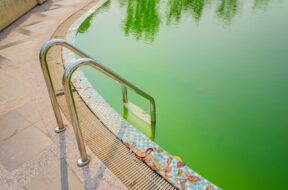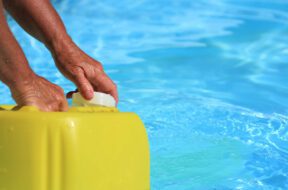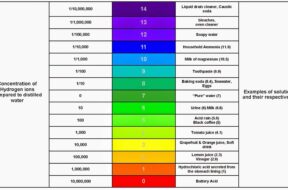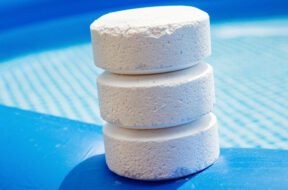
Want to learn more about algaecide? Read on to find out when to add algaecide to your pool maintenance routine and other helpful tips.
Keeping your swimming pool clean is a hard job. Vacuuming, skimming, cleaning, balancing. It can sometimes seem like a full-time job. Pool cleanliness and care are musts as a pool owner. But, there are ways to maximize your pool’s health and keep it clean for longer. Tips and tricks that we’ve thought up here at Pool Calculator will be crucial for you to help limit the time you spend working on your pool and maximizing the time you get to spend enjoying your pool. Here are 5 tips to keep your swimming pool clean.
This step may seem like a no-brainer since we are Pool Calculator, but pool chemistry is vital to pool cleanliness. If your pool is even slightly out of balance your cleanliness could be compromised. Ways to identify that your pool chemistry is off is if your water foggy, forming algae, or otherwise showing signs of dirtiness not related to typical grime. This will mean there is a large problem to treat, but you should have tested your water before these problems showed themselves.
Even if your pool looks crystal clear it is still recommended to test your pool water as often as possible. This will help you correct small mistakes before they become a huge problem and neutralize bacteria and other harmful nuisances as early as possible. We at Pool Calculator recommend testing your pool chemistry at least couple times a week. A off-balance level of chlorine, pH, or other tests can greatly affect your pool water no matter how much you clean it.
A pool cover is something most owners have but don’t see as essential. Pool covers are great for retaining heat and maximizing safety for your family and pets. However, most relevant to this article, is how pool covers keep your pool clean.
Especially in places with a lot of wildlife, a pool cover is a life saver for pool owners. Leaves, dirt, animals, and much more all have free access to your pool if there is no cover on it. This debris can be difficult and time-consuming to clean, so having a pool cover to block your water off from unwanted guests is key to keep your pool clean.
For an article focusing specifically on pool covers, click here.
A pool filter’s full-time job is to clean your water around the clock. Usually if something is wrong with your filter you will be able to tell pretty quickly. But think of your pool as a large fish tank. It is important to make sure your filter is up to date, clean, and not clogged in any way.
If your pool filter is compromised in any way you will want to know as a pool owner. Fixing this problem may hurt your wallet in the short-term but will keep those swimming safe and save you a lot of time in pool maintenance.
Which type of pool filter is right for you?
Regardless of a pool cover, your pool is bound to fill up with debris over time. This trash can throw off your pool chemistry, breed bacteria in your water, and look awful too! We advise to skim your pool of all debris once a day to maximize your pool cleanliness.
A skimmer is a vital part of pool cleanliness, and almost anyone can do it. Simply look for trash and debris in your pool and “spot-clean” it to a respectable level. This combined with your filter and pool chemistry will give you a clean pool.
Skimming your pool is a part of regular pool maintenance. For more articles on pool maintenance, click here.
Simply maintaining your pool chemistry, filter, and skimming will not be enough to keep your pool clean forever. More strenuous tasks will be necessary to keep your pool clean. These chores include vacuuming, scrubbing the sides of your pool, and shocking your pool. All of these will benefit your pool in the long-run.
These are not tasks that will need to be performed as often as other tips on this list, but your pool does still need them. Humans and pets are not as clean as we like to image they are, and their dirt and grime will build up in the pool over time. This will require you, the pool owner, to stay on top of this cleaning to keep your from becoming a gross and unkept mess.
For an article on how to vacuum your pool, click here.

Want to learn more about algaecide? Read on to find out when to add algaecide to your pool maintenance routine and other helpful tips.

In this quick guide, we’ll answer the question “can you over shock a pool” and unveil the factors to consider when shocking a pool.

Maintaining both pH and total alkalinity in your swimming pool is important for keeping your pool properly sanitized and non-corrosive. Total alkalinity is to pH what cyanuric acid is to free chlorine. Total alkalinity stabilizes pH levels. The ideal pool pH level is 7.4 to 7.6. The ideal total alkalinity level is 80 to 120 ppm.

The Association of Pool and Spa Professionals recommends free chlorine levels for both swimming pools and hot tubs be kept between 2.0 and 4.0 ppm. However, the Center for Disease Control recommends free chlorine stay above 1 ppm in pools and 3 ppm in hot tubs.